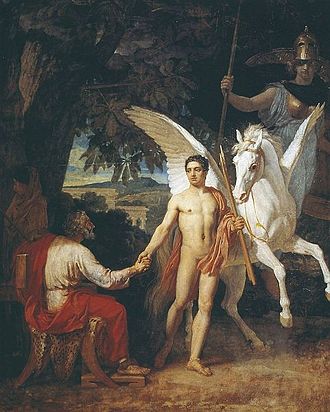Philonoe
Jump to navigation
Jump to search

(PD) Painting: Alexander Andreyevich Ivanov
Philonoe (the second one; there were two) married Bellerophon, who rode the winged horse Pegasus and killed the Chimera by putting lead into its mouth; it melted, suffocating the monster. Later, Bellerophon either married Philonoe or had an affair with her (depending on which source is used).
Philonoe (the second one; there were two) married Bellerophon, who rode the winged horse Pegasus and killed the Chimera by putting lead into its mouth; it melted, suffocating the monster. Later, Bellerophon either married Philonoe or had an affair with her (depending on which source is used).
In Greek mythology, there were two characters named Philonoe.
- First, there was Philonoe who had a father named king Tyndareus of Sparta. Her mother was Leda, and her siblings included Castor, Polydeuces, Clytemnestra and Helen of Troy and, according to one source, a sister named Phoebe and Timandra.[1] The goddess Artemis made her immortal, according to two accounts.[2][3] She was a minor character in Greek mythology. According to a second account which suggests that Philonoe died young, the goddess Aphrodite was mad at Philonoe's father Tyndareus since he had forgotten to offer a sacrifice to her but did offer one to the other gods; as a result, Aphrodite punished Tyndareus with a curse that all of his daughters would be known for adultery. As a result, Clytemnestra, Helen of Troy, and Timandra all committed adultery against their husbands, but that Philonoe "died too young" along with her sister Phoebe to commit adultery.[1]
- Second, there was another character in mythology named Philonoe who married Bellerophon, the exceptional cavalry rider of Pegasus, which was a winged horse given to Bellerophon by Athena. Bellerophon, after numerous triumphs, including defeating the dangerous monster Chimera, was given the most fertile land in the kingdom of Lycia by her father Iobates, and Philonoe became queen.[4] According to one source, Philonoe's sister Antea also loved Bellerophon, but he rejected her, and Antea committed suicide; the source suggests that Philonoe had an affair with Bellerophon (as opposed to marriage).[5]
References
- ↑ 1.0 1.1 Clytemnestra and Her Impact on Greek Art and Culture, Unknown, 2010-04-20. Retrieved on 2010-04-20. “Question: I've heard that there was a prophecy that Clytemnestra and her sisters would be unfaithful to their husbands. Is this true? and why was such a curse put on the sisters? Answer: Aphrodite had doomed Helen and her sisters because their father, Tyndareus, had sacrificed to the other gods but had forgotten to offer a sacrifice to her. Aphrodite, therefore, swore to make his daughters known for adultery. The daughters of Tyndareus included the twins Helen and Clytemnestra, Philonoe, Timandra, and Phoebe. Philonoe and Phoebe died too young to be affected by the curse.”
- ↑ Thomas Keightley and Leonhard Schmitz. Mythology of Ancient Greece and Italy, Unknown, 2010-04-20. Retrieved on 2010-04-20. “see p. 381”
- ↑ C. Scott Littleton. Gods, Goddesses, and Mythology, Volume 6, Marshall Cavendish, 2010-04-20. Retrieved on 2010-04-20. “page 812”
- ↑ HERO’S OF GREEK MYTHOLOGY - Bellerophon, ABCTales.com, 2010-04-20. Retrieved on 2010-04-20. “Bellerophon was born the son of Eurynome and the God Poseidon And was raised by King Glaucus who thought he was his own son. Bred in Corinth as the son of the most skilled horseman of the day ... And that the Gods would not show such favor to a dishonorable man, Iobates made peace with him giving him half of his kingdom of Lycia, Including the most fertile land and the hand of Philonoe his daughter.”
- ↑ Bellerophon, mlahanas.de, 2010-04-20. Retrieved on 2010-04-20. “The Chimera suffocated, and Bellerophon returned to King Iobates victoriously. Iobates was unable to believe that this valiant hero deserved death, and so he allowed Bellerophon to marry his daughter. Alternatively, Iobates' daughter, Antea, loved Bellerophon. He scorned her and she committed suicide. Iobates' other daughter, Philonoe, had an affair with Bellerophon.”